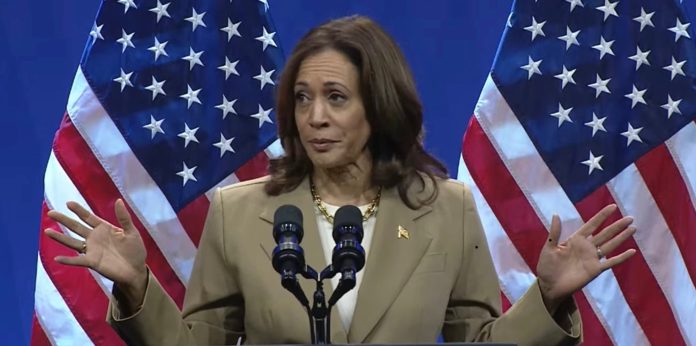California Local News Fellow Jia H. Jung analyzes APIA Vote’s Presidential Town Hall.
By Jia H. Jung, California Local News Fellow
During the crux of her speech at APIA Vote’s 2024 Presidential Town Hall in Philadelphia, Vice President Kamala Harris shouted that anyone who vilifies immigrants promotes xenophobia, stokes hate, or incites fear the way Donald Trump has should never again have the chance to stand behind a microphone or the seal of the President of the United States of America.
“There is so much at stake in this moment,” she continued, resuming her keynote address to a nearly two-thousand-strong audience inside the Pennsylvania Convention Center on July 13.
A chorus of dissenting voices interrupted her – counter chants of “four more years” momentarily drowned it out.
“ – and we will have those four more years, and we will have those four more years,” Harris rebounded. But when she attempted to move on, chants of “free, free Palestine” grew around the auditorium. She froze for a moment, beaming out toward the voices.
“We are fighting for a democracy and democratic values, which includes the right for everyone to speak. And, I will then – we are gonna have four more years also,” Vice President Harris said, before warning the crowd that the Supreme Court had recently rendered Trump immune for dictatorial actions he has stated he will take if he re-enters The White House.
What was intended as a collaborative town hall became a campaign rally for the Biden-Harris ticket, short Native Hawaiian and Pacific Islander representation, and alienating a reported majority of young Asian and Pacific Islander voters who are serious about clarifying politicians’ positions in regard to Palestinian human rights. The session also omitted any conversation about the foreign affairs and trade deals that drive the migration of and affect the quality of life for the fastest-growing immigrant group in the country.
The AANHPI leaders present, highly anticipated by a coalition of the country’s most preeminent Asian and Pacific Islander advocacy and civic engagement organizations, showed what to vote against more than what to specifically vote for. But the protest during Harris’s appearance crystallized how fear of Trump is no longer sufficient, if it ever was, to inspire unified mobilization of communities as diverse as Asian Americans, and, distinctly, Pacific Islanders.
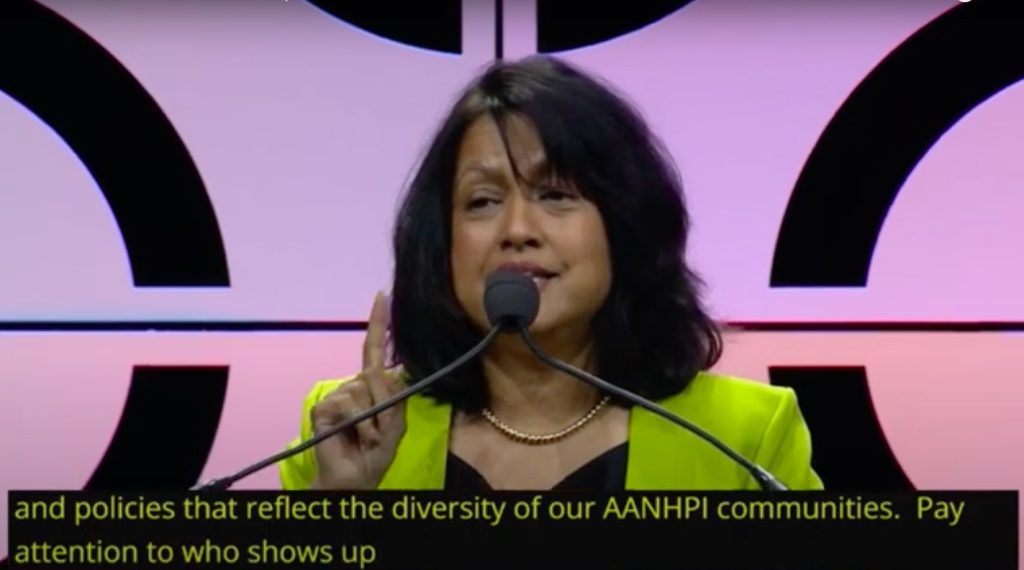
APIA Vote, a nonpartisan organization promoting Asian and Pacific Islander civic engagement, launched its presidential town hall events in 2008 as a means of bringing political leaders and candidates with varying views to directly engage with the Asian and Pacific Islander communities about topics that matter to them.
No presidential candidate joined this year’s event, which was co-produced by the Center for Asian American Media (CAAM). President Joseph Biden, still unrecovered from the first round of on-air presidential debates on June 27 that set off calls for his resignation, sent Vice President Kamala Harris to represent the Democratic position.
No one from the Republican party responded to APIA Vote or its coalitions’ attempts at outreach, and no green or third party candidates were part of the event.
This left a program dominated by Northeast Asian Democrats – Chinese American U.S. Representative Judy Chu (D-CA, Dist. 28), Taiwanese American U.S. Representative and Democratic Caucus vice chair Ted Lieu (D-CA, Dist. 36), and Japanese American delegates from Hawaiʻi, U.S. Representative Jill Tokuda and U.S. Senator Mazie Hirono).
Movingly, Rep. Tokuda said, “We are descendants of people and civilizations centuries older than this country that we now call home. In our blood runs centuries, generations, years and years of cultural and historic triumph and trauma. We speak over 100 different languages and dialects. We represent over 79 different ethnicities. This is our superpower. This is our strength. And if there’s ever been a time when this country has needed to draw on our collective experience, our values, our knowledge, the way we lead with compassion and grace and dignity, it is now.”
However, when the words of aloha and mahalo rang out in the halls, they were not uttered by Native Hawaiian leaders, nor was there space held up for the unseated sovereign kingdom of Hawaiʻi, its kanaka, the unique challenges faced by the “NHPI” part of “AANHPI,” or how those difficulties will be allayed in the future by AANHPI leaders in the U.S. government professing to represent everybody.

The leaders focused on how AANHPIs in aggregation were the fastest-growing race/ethnicity in America and therefore fastest-growing voting bloc to continue enforcing seats at the American table. The guests harked back to the past to congratulate the overall community on collective, hard-won gains in political representation even if these gains have yet to benefit all subgroups of people designated as “AANHPI.”
Rep. Chu mentioned the Chinese Exclusion Act of 1882 and the internment of Japanese Americans during World War II as cautionary tales that continue to inform the ongoing fight today against Republican attempts to reinstate the China Initiative and expand alien land laws.
(Alien land laws started in California on May 3, 1913, as a means of denying Japanese immigrants a way to own land until 1953. In 2024 alone, 32 states submitted 151 bills with the intent to exclude foreign citizens, e.g. Chinese nationals, from land ownership. Seven of these bills passed. Indiana, Nebraska, South Dakota, and Florida explicitly bar Chinese citizens from some form of property ownership.)
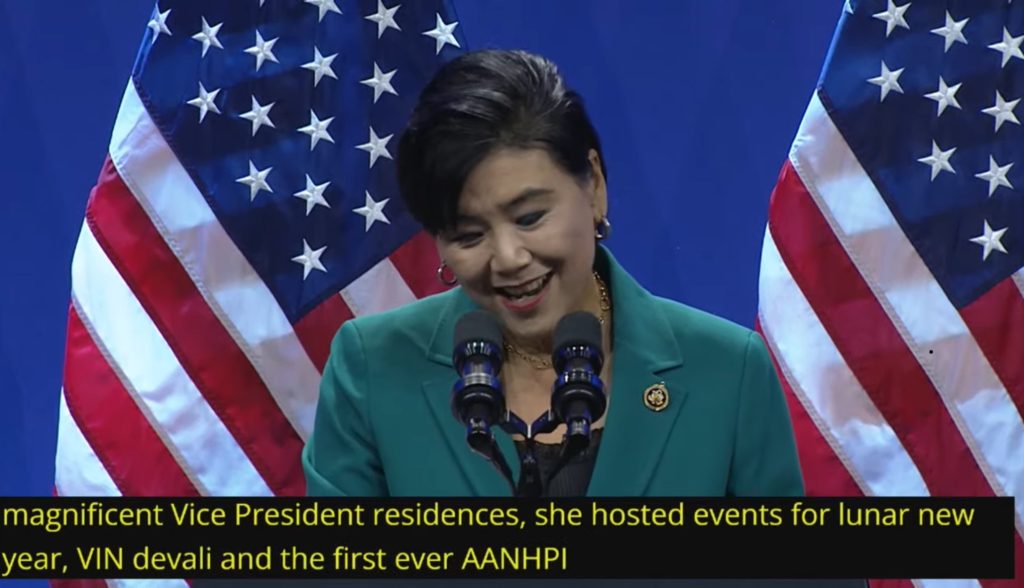
More than one speaker at the town hall reviewed the still-raw wounds of the AANHPI community. The Atlanta spa shootings. Monterey Park. The hit small business took during COVID-19 shutdowns. The more than tripling of violent hate crimes across the country against Asian people after Trump blamed the “kung flu” virus on people who look like the Chinese.
The terms “at stake” and “crossroads” were frequently invoked to rally voters to show up at the 2024 elections like never before, improving upon the 60% increase in APIA voter turnout and a 23% first-time voter rate seen in the 2020 elections. Harris called the upcoming vote “existential,” the one.
Despite the projected confidence and exultation, there was an air of urgency to forcefully unite the AANHPI community around the Biden-Harris ticket in order to avoid a Trump presidency.
According to a survey results released on July 10 by AAPI Data, nearly 1 out of 3 of eligible AAPI voters surveyed planned on voting for Trump and 46% responded that they were committed to voting for Biden. This was before the debates and represented an 8% decrease in support from 2020. Five percent said they planned to vote for an alternate candidate, while a whopping 18% of the participants were undecided or refused to answer.
Many of the leaders pointed out the bad things that Trump had done, such as place Asians and Pacific Islanders in the “other” category in COVID-19 death counts, increase hatred toward Asians, and reverse Roe v. Wade. They also uplifted what the Biden-Harris administration has done, such as defend the Affordable Health Care Act and social security, and create an initiative to disaggregate the 2020 Census.

APIA Vote
When at the podium, Vice President Harris also touted how the current presidency had capped insulin shots at $35 each, benefiting approximately 2 million AANHPIs, and how she and the president had devoted $160 million to build parks, bike lanes, and walking paths over the expressway cutting through Philly’s endangered Chinatown.
Little of this fit into the forward-looking theme of the program, Building Momentum. Few future specifics were discussed beyond ominous allusions about the absolute need to prevail over Trump on November 5 in order to hold ground.
Opportunities for substantive, AANHPI-specific discussions about climate change and natural disasters, crime and hate crimes, gun ownership and arms control, mass incarceration, immigration, education and health care access, mental health, foreign policy decisions, and trade deals affecting global migration and daily domestic life for the Asian and Pacific Islander diaspora in the U.S. took a back seat to prepared speeches without any period for audience questions.
The bulk of in-person presentations and prerecorded video productions submitted by community organizations focused on the interests and struggles of what the swing states are likely to be for the Democratic candidates come November – Michigan, Wisconsin, Minnesota, North Carolina, Georgia, Pennsylvania, Arizona, and Nevada.
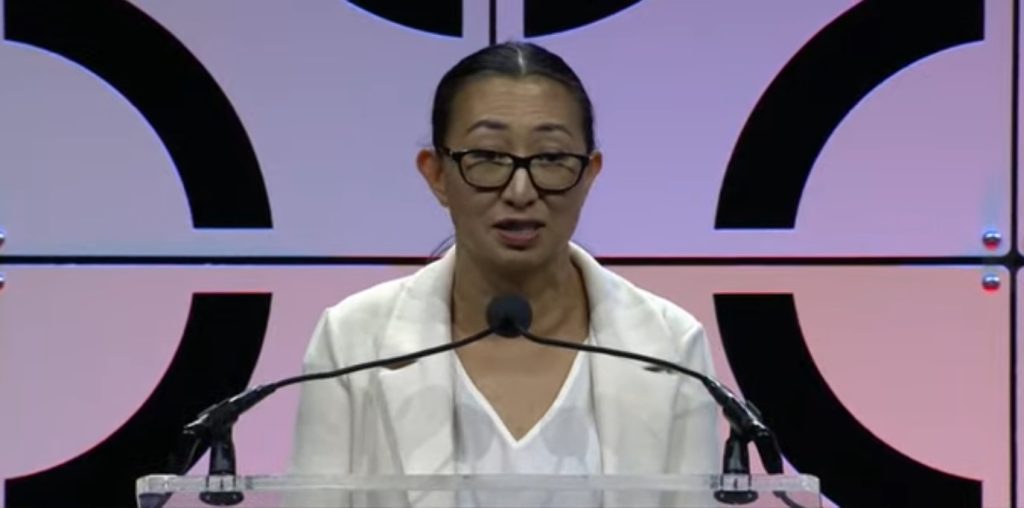
Standout presenters included Vietnamese American operations director Lan Hoang from Arizona AANHPI For Equity and Duy Nguyen, vice president and CEO of the Asian Community Development Council of Las Vegas.
Hoang told a pandemic-time anecdote about surmounting language barriers to provide vaccinations to 3,000 people in her community, and asked, “How do you plan to address the health inequities such as the lack of language access and elder care uniquely experienced by our AANHPIs?”
Nguyen pointed out that there were 40 AAPI languages in Las Vegas alone, revealing a screaming need for disaggregated data. He concluded, “All over the country, we have to do so much more to identify our needs and be able to ensure that we as a community are always being prioritized. There is some effort going on, but there needs to be more, and we need to begin and continue to tell our story, and that’s how we, in November, can make our communities visible.”
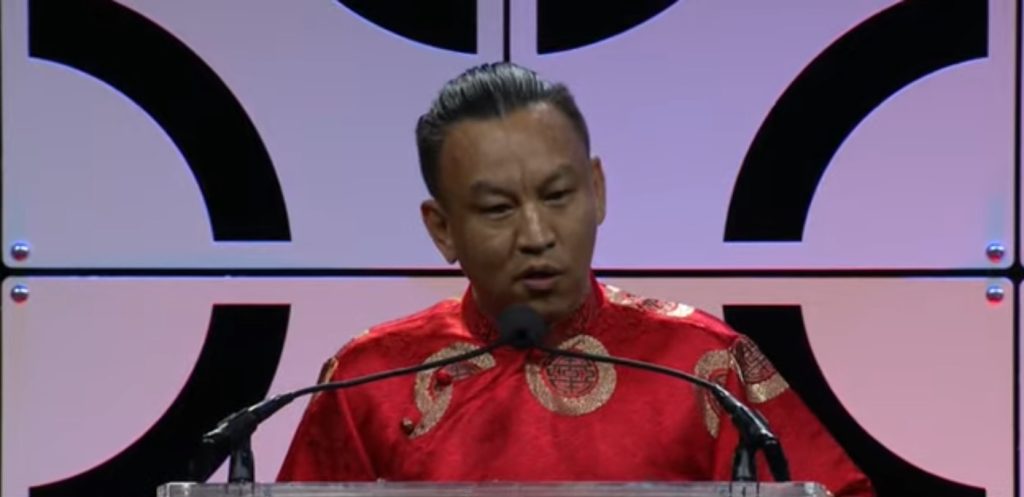
However because all of the candidates and leaders had already finished delivering their prewritten speeches, the community representatives received no response to their deliveries. Offstage, community organizations that had taken time to submit questions for the town hall before the event felt confused as to why there was no platform for any of them to be addressed.
Finally, there was no treatment of Native Hawaiians and Pacific Islanders beyond their inclusion in the acronym “AANHPI,” save for a video highlight submitted by Council for Native Hawaiian Advancement about rebuilding after the Maui wildfires, and fewer than five minutes of stage time split by the council’s CEO Kūhiō Lewis and Taffy Maene-Johnson, a trans woman from Samoa and executive director of the United Territories of Pacific Islanders Alliance: Washington (UTOPIA).
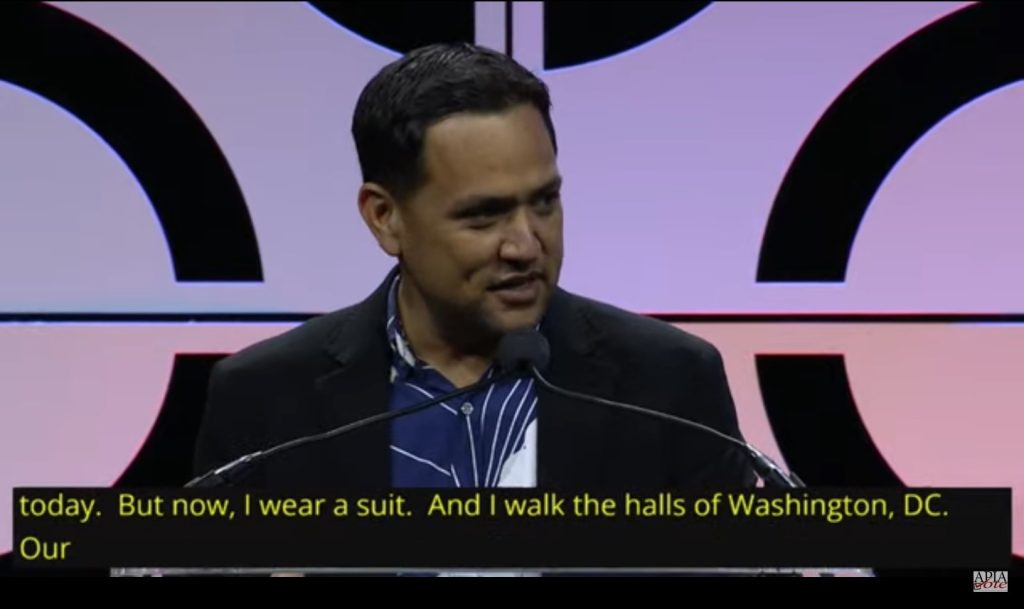
The articulate, direct representative for some of America’s most marginalized, intersectional communities, community organizer demanded equal health care access for everyone, including trans people. Her words hung in the ether.
The show ended with a thanking of the event’s sponsors, all mega-corporations except for the Wallace H. Counter Foundation and The Asian American Foundation (TAAF), a prominent and well-funded but increasingly controversial philanthropy after retaining Jonathan Greenblatt, CEO of the Anti-Defamation League on its board even after the executive likened supporters of Palestinians to Nazis.
(Full disclosure: The non-profit publisher of AsAmNews, Asian American Media Inc., received $15,000 from TAAF for scholarships to support journalism students and enhance training for early career journalists.)

The presentation was the only public-facing program of several other concurrent events over the course of the week and weekend – the AAPI Leadership Summit, the Asian Pacific American Institute for Congressional Studies National Academy, the Japanese American Citizens League National Convention, and the Organization of Chinese Americans National Convention happening alongside the town hall.
During some of the side conferences, undergraduates and professional interns at the start of their political and advocacy careers expressed disappointment that none of the programming was devoted to finding solutions for serious problems like the U.S.-backed genocide of Palestinians by the state of Israel. Along with many young AANHPI folks, the absence of this topic in the schedule of events also marginalized Muslim, Southeast Asian, and South Asian communities – the Brown Asians.
“We can do better than that,” was the resonant spirit at the end of the day. This had been the common refrain among the town hall’s speakers like actress Tamlyn Tomita of Karate Kid 2 and Cobra Kai fame. Tomita was among the first in the lineup to try and hype the tentative crowd into cohesion around the almost-within-reach first of an Asian American, African American female presidency – a possibility undiscussed but tangible in the atmosphere.
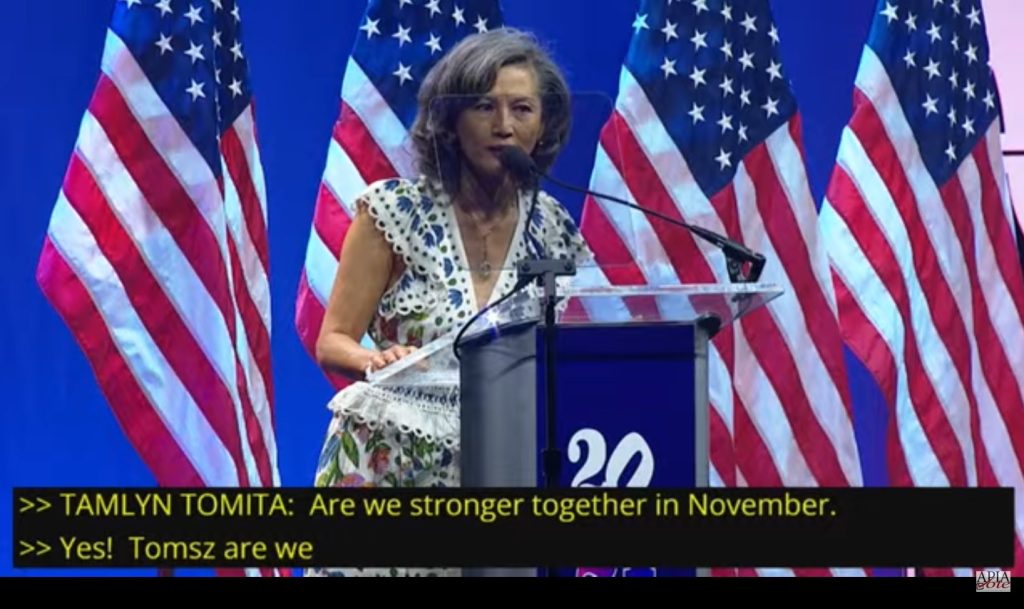
The live audience’s reactions showed that not all AANHPIs were on board for the largest platform giving visibility to AANHPI concerns to be reduced to (Biden-)Harris vs. Trump.
Meanwhile, in Bulter, on the western side of the states, shots broke out at Donald Trump’s rally that was taking place on the same afternoon. The offices of both Biden and Harris promptly issued statements condemning the act of violence and stating general sentiments of gladness that Trump, though injured by the shootings, was reportedly “fine.”
Thus far, the Butler County District Attorney has confirmed that fifty-year-old spectator Corey Comperatore was killed in the crossfire while shielding his family. A U.S. Secret Service sniper killed the shooter, identified as 20-year-old Thomas Matthew Crooks. At the time of writing, two other rally attendees were injured and in critical condition.
To register to vote through with the help of APIA Vote , text “AAPI” to 788-683.
AsAmNews is published by the non-profit, Asian American Media Inc.
We are supported through donations and such charitable organizations as the Robert Wood Johnson Foundation. Donations to Asian American Media Inc and AsAmNews are tax-deductible.
Please also follow us on Instagram, TikTok, Facebook, YouTube and X.

